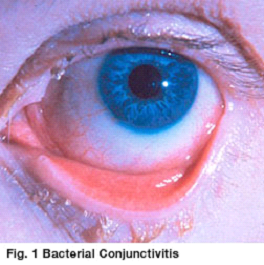Conjunctivitis or "pink eye" is a condition where the eyes look pink or red and may have discharge. Symptoms may include burning, itching, irritation, discharge, or crusting of the lashes.
Conjunctivitis may be caused by bacteria, viruses, other infectious agents, chemicals, or allergies.
If the conjunctivitis is caused by bacteria, treatment with antibiotic drops or ointment may be indicated. Using the medication for the fully prescribed duration is necessary to prevent recurrence. Viral conjunctivitis does not respond to antibiotics. Allergic conjunctivitis can be treated with allergy eye drops.
Conjunctivitis caused by bacteria or viruses is contagious [See figure 1].

Hand washing is the most important preventive measure. Never touching your eyes or the facial area unless you have just washed your hands is also important. If you wear contact lenses, hand washing is especially important, as well as disinfecting lenses/disposing lenses on schedule. Never store your lenses in a solution other than the commercially prepared solutions. Never swim in a lake or hot tub with your lenses on.
There may be an infection, but this may be secondary to a blocked tear duct in an infant.
Most infections will clear without complications. Any neglected infection can result in secondary vision problems. Viral eye infections, especially herpes, can affect vision.
No. Sometimes a pink eye can indicate other eye problems including allergy, foreign body, contact lens reaction, inflammation or glaucoma.
Reference: American Association for Pediatric Ophthalmology and Strabismus

